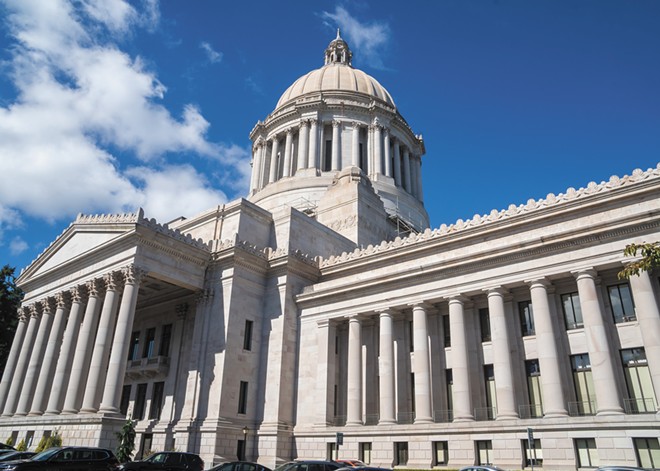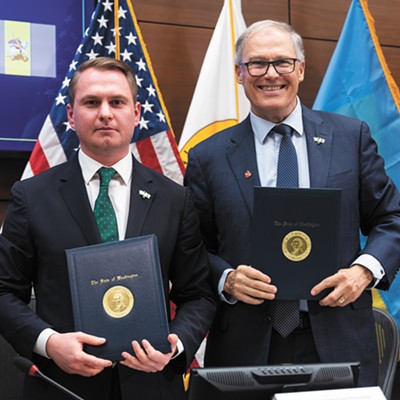Washington is in a short legislative session this year, with work expected to end on March 7. Bills are making their way through public hearings and heading to the floor for a vote, as they need to pass the House or Senate by Feb. 13 so they can be shared with the other chamber for consideration.
Meanwhile, Idaho lawmakers have until March 4 to transmit bills from one house to the other, with their legislative session set to end on March 22.
Here's a roundup of some noteworthy bills working their way through the process.
WILDFIRE AND DISASTER RECOVERY
Washington state Rep. Mike Volz, R-Spokane, sponsored multiple wildfire relief bills.
House Bill 1899 would allow wildfire victims who lost their homes in 2023 (such as those impacted by the Oregon and Gray fires in Spokane County) to rebuild their homes to the current building code if they get a permit before July 2025. The state Building Code Council has created new, more energy-efficient and restrictive rules that were expected to take effect last fall but have been delayed to March 15. The new code could add thousands to the cost of construction.
The state Office of the Insurance Commissioner warned that homeowners could struggle to insure their new homes if not up to code when built. On Friday, Jan. 26, the House Local Government Committee recommended a substitute bill, which would expect people to build to the new code (assuming it's in effect) and instead offer state grants for energy efficient upgrades.
HB 2283 would allow state and school district employees impacted by an emergency or disaster to take shared paid leave, donated by other state employees. They'd have to exhaust their own paid leave before accepting donated leave.
AIRBNB SUBSIDIZED AFFORDABLE HOUSING
Senate Bill 5334 (no local sponsors) would allow Washington cities and counties to collect up to a 10% excise tax on stays at short-term rentals through platforms such as Airbnb or VRBO. A carryover from last year, the bill passed the Senate on Jan. 24 and returned to the House. The revenue generated would be spent on affordable housing, including homeless housing assistance programs.
ARMED SCHOOLS
Last week, Idaho state Rep. Ted Hill, R-Eagle, introduced HB 415, which would allow school teachers, staff or volunteers to carry a gun, provided that they have an enhanced concealed carry permit. It would fine schools with "gun free zone" signs $300.
Each person would be required to inform the principal and superintendent and maintain concealed, immediate control of the weapon. Local and state law enforcement would also need to be notified. However, the bill would not require notice to school boards and would exempt the list of people carrying weapons from public disclosure.
The NRA-supported bill had a public hearing on Jan. 24.
"You have to answer violence with violence," Hill told the House State Affairs Committee. "You can't sit back and passively hope it's gonna be OK."
Tara Adams of Boise testified that she and her husband survived the mass shooting in Las Vegas in 2017, are responsible gun owners, and oppose the bill.
"I cannot imagine how much worse the shooting we survived would have been if concertgoers had been allowed to bring concealed weapons into that arena," Adams said. "How would first responders have known which gun holder was the original perpetrator and which ones were the defenders in the midst of terrifying chaos?"
Representatives for the Idaho School Boards Association and the Idaho Education Association, the state teacher's union, strongly opposed the bill. Idaho law already allows individual districts to craft policies allowing guns or not. But the bill would remove that authority from elected school boards, even though they are statutorily obligated to protect the safety of their students, said Paul Stark, executive director of the IEA.
"There has been some testimony this session about not trusting librarians with books. But this trusts librarians with a Glock," Stark testified.
The committee voted 11-2 to send it to the floor with a "do pass" recommendation. The House could vote on this bill this week.
THE MIGHTY PEN
Speaking of libraries, multiple Idaho bills are aimed at restricting materials.
HB 384 would make it illegal for librarians to provide obscene material to minors. Idaho Gov. Brad Little vetoed a slightly different law last year. This year's attempt requires people to give written notice of questionable material to their library, providing 30 days for them to relocate it to an adults-only section. If not relocated, a parent or guardian can sue and win up to $250 (reduced from last year's $2,500) and actual damages.
SB 1221 would require districts to create library materials review committees that would decide if materials should be pulled from school libraries after someone complains.
Washington, meanwhile, is considering SB 6208, which would prevent districts from banning books or educational material "on the basis that it relates to or includes the study of the role and contributions of any individual or group who is part of a protected class." Washington law prohibits discrimination based on sex, race, gender identity, sexual orientation, religion and other "protected classes." ♦

























